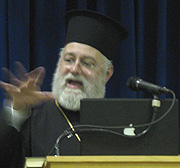
by Chris Banescu –
Bishop Savas (Zembillas), GOA’s Director of the Office of Church and Society, has launched into yet another missive against conservatives whom he frequently condemns of hating the poor and only protecting the rich. On his facebook page, the main venue where one can find the bishop’s real views and interests, he recently posted a blame Republicans editorial from The New York Times titled “The New Resentment of the Poor.” Apparently forgetting that envy is a sin and truth-telling a virtue, Bishop Savas highlights his class-warfare passions in several false claims he posted in the discussions related to the NYT article.
This is not the first time Bishop Savas has posted such biased hit pieces on his facebook wall. He has a long history of supporting pro-Democrat and anti-Republican views via his many postings of overwhelmingly liberal and leftist-leaning commentary from NPR and The New York Times, his favorite sources of “balanced and objective” news and views. However, this latest editorial further showcases his superficial and misinformed thinking on taxation via several outlandish statements that distort the truth and advance a leftist/progressive agenda.
Falsehood #1 – Employee Social Security and Medicare Tax Rates
In the comments section below The New York Times editorial link, Bishop Savas makes this claim (emphasis mine):
“even those who don’t pay federal income tax pay 16% of their total income on taxes. A person making $30,000 pays around $5,000.”
What he calls “total income on taxes” are the combined Social Security and Medicare taxes that individuals must pay to the federal government (in addition to federal and state income taxes). These are taxes that are automatically deducted by employers from their employees’ payroll checks. Based on the numbers he cited, employed individuals would pay a 16.7% ($5,000 divided by $30,000) combined Social Security and Medicare tax rate on income. Unfortunately, the bishop’s assertion is wildly inaccurate. He’s not just wrong by a few percentage points, but off by more than 100%.
According to federal government guidelines, by law employees are required to pay a 6.2% Social Security tax and a 1.45% Medicare tax on their earnings. This means that employed individuals must pay a combined SS/Medicare tax of 7.65% on their income. The employer must also match those taxes and pay an additional 7.65% of the employee’s salary directly to the federal government. Those additional taxes are paid by the employer only and are not deducted from the employee’s earnings.
Relying on some simple web research and basic math, we arrive at $2,295 per year of Social Security and Medicare taxes that employees earning $30,000 per year actually pay (nowhere near the $5,000 alleged). The matching $2,295 in SS/Medicare taxes are paid solely by an employer from his own earnings, not the employee’s pocket. This means that Bishop Savas’ erroneous example exaggerates these taxes by nearly 218%, asserting a fictional 16.7% vs. an actual 7.65% tax rate; a percentage two times bigger than reality.
Falsehood #2 – Viacom CEO Salary for 2010
The second falsehood from Bishop Savas, in the same facebook section, focuses on the 2010 salary of Viacom’s CEO (emphasis mine):
“The CEO of Viacom made $754,000,000 last year – around $2,000,000 a day, give or take. What percentage do you think he owes in taxes?
Such an enormous salary, nearly 3/4 of a billion dollars, for just one year’s worth of work is indeed shocking. The problem is that it’s not true. The assertion is meant to scandalize the reader and justify resentment of the other. It’s an audacious condemnation in support of the same liberal/leftist bias seen in the NYT article posted on his facebook wall. Bishop Savas is shamelessly distorting the facts.
A quick search on Google reveals the truth regarding the actual compensation that Mr. Phillippe Dauman, the CEO of Viacom, was awarded last year. As reported by the Los Angeles Times:
“Viacom Inc. Chief Executive Philippe Dauman was awarded salary, stock and other benefits totaling $84.5 million during the nine months of 2010 that were covered in Viacom’s fiscal year.
That amount included one-time stock award worth $31.65 million — money that was not paid to Dauman in 2010 but will vest over the next five years if the company achieves certain performance goals. The grant was bestowed on Dauman as a signing bonus in April after he extended his employment contract six and a half years.”
Notice immediately that the 2010 “awarded salary, stock and other benefits” is orders of magnitude smaller than the bishop’s imaginary amount. It is only $84.5 million vs. $754 million. Notice also, that a large portion of that salary, $31.65 million in fact, is deemed as “one-time stock award”; it hasn’t been paid to Mr. Dauman yet. That amount will vest over the next five years if the company meets very specific performance guidelines. He will only receive that compensation in the future if he fulfills the goals identified in his 5-year contract with Viacom.
The money Mr. Dauman was actually paid in 2010 is probably closer to $52.85 million. That’s indeed a nice chunk of change. But, it’s a whopping 1,427% smaller than what Bishops Savas said it was. That’s quite a discrepancy! Yes, we’re still talking about large amounts of money, but why the need for such ludicrous embellishment?
Even assuming a very superficial reading of the LA Times piece and using the $84.5 million compensation number, still leaves us with a 892% exaggeration of the facts. Is the desire to justify a viewpoint and promote an agenda so powerful that accuracy and truth no longer matter?
Falsehood #3 – Total Income Tax Rates on the Rich
Bishop Savas also erroneously assumes that someone earning $754 million per year would only pay $250 million in taxes:
“The CEO of Viacom made $754,000,000 last year – around $2,000,000 a day, give or take. What percentage do you think he owes in taxes? Say, for the sake of argument, he pays back $250,000,000. That would leave him with only a little more than half a billion dollars. Who would have made the greater sacrifice, him or the guy who paid $5,000 out of his $30k? Who is likely to have felt it more?”
Using his numbers gives the impression that a rich CEO pays only 33.1% in income taxes, allowing him to keep 66.9% of what he earned. This is also not true.
First of all, the marginal Federal Income Tax rate is currently 35% for anyone earning more than $379,150 per year (cut-off was $373,650 in 2010). Right away, the bishop’s math is off by almost 2%. [NOTE – the federal tax rates are less for the first $379,150 earned, but for practical purposes when dealing with millions in income the effective rate approaches 35%.]
Second of all, Bishop Savas conveniently leaves out an additional 1.45% Medicare tax that the federal government imposes on all income earned. This raises the federal tax to 36.45%. And we’re not done yet. State incomes taxes must also be paid.
Assuming that Mr. Phillippe Dauman is a resident of New York (a fair assumption since the corporate headquarters of Viacom Inc. are in New York City), he must also pay state and local income taxes due each year. A brief overview of New York’s state tax laws by the nonpartisan Tax Foundation reveals a tax rate of 8.97% on all income over $500K per year. We’ll round that out to 8.9% for simplicity and to account for the slightly smaller tax rates bellow the half million dollar mark.
Adding the 8.9% NY state tax rate to the 36.45% Federal tax rate brings the Total Tax Rate to 45.35%, roughly 37% larger than Bishop Savas asserts. Had Mr. Dauman actually earned $754 million for 2010, the IRS and New York State authorities would have appropriated about $342 million of that money (almost half), not $250 million (only a third) as claimed.
The reality is that New York taxpayers in the highest income brackets keep just 54.65% of what they actually earn each year. This is significantly less than the fictional 66.9% asserted by Bishop Savas. Nearly half of what the rich earn is confiscated and redistributed by the government. What’s wrong with sticking with the facts?
Better Silence Than Foolishness
As Abraham Lincoln once observed, it is often “better to remain silent and be thought a fool than to open one’s mouth and remove all doubt.” A little moderation would be wise before stepping into the public arena and proclaiming such whoppers. This is especially egregious given that the truth is just a few keystrokes away, discoverable via a few Google searches and some basic math.
It’s been said that economists should not do religion. Maybe religious figures should not do economics.




Since the article was published Bishop Savas responded on another Orthodox priest’s facebook wall and made some additional claims. Listed below are his latest assertions and my detailed responses:
Bishop Savas claims:
Chris Banescu responds:
The point of the article centered on the compensation of the CEO of Viacom centered on his SALARY (caps meant for emphasis not loudness), not additional investment income from long-term investments that said CEO may have also received from stocks he owned in other companies. When the $754 million number was mentioned it was clearly intended as such. This fact was confirmed by Bishop Savas when he himself admitted on 9/1/2011: “Chris Banescu is right. The CEO of Viacom made only $85,000,000 last year, not $750,000,000. I apologize for my error.” He now wants to re-write history and deflect from the plain meaning of his own words that he himself admitted to already. Can’t unring that bell.
Furthermore, this is not just a “misunderstanding” on his part. The salaries of CEOs are public information. Their actual personal incomes on their 1040 forms are NOT. When someone claims that such and such CEO “made this amount” they are clearly taking about his salary, not his dividends or capital gains from other investments.
Bishop Savas claims:
Chris Banescu responds:
Yes, it’s true that the Income Tax on dividends and capital gains from stock investments held for at least one year are taxed at a much lower 15% rate.
However, Bishop Savas completely ignores the double taxation aspect of investments. He fails to mention (as does President Obama, Warrant Buffet, and many others) that dividend income streams reach the taxpayers after they have been already taxed once at the corporate level (there are some exceptions with REITs and certain Trusts, etc.). The dividend income then gets taxed a second time when individuals report this income to the IRS. That 15% tax rate is on top of the other 35% to 41.6% average corporate federal and state tax rates — from the lowest (35%) in Nevada, Wyoning, and South Dakota to the highest (41.6%) in Pennsylvania and Iowa, as reported by the nonpartisan Tax Foundation — across the US.
Stocks grant investors part-ownership of companies. The money invested buying stocks is 100% at risk. You are an owner of this business and the earnings it produces are lawfully and ethically yours. That income is your income. Yet, you are not entitled to see a dime of it until the government confiscates at least half of it (50% to 56.6% approximate rates) before you’re allowed to keep it. This truth is almost always ignored or purposely misrepresented when the issue of dividends taxation is brought up.
Bishop Savas claims:
Chris Banescu responds:
Yes, certain taxpayers are allowed to reduce their federal taxable income by the amount of state and local taxes they pay via Itemized Deductions in Schedule A of the 1040 form.
However, there is more to the issue.
(1) The federal rate is actually 36.45% since the 1.45% Medicare tax is on ALL earnings. (http://ssa.gov/pubs/10003.html) I covered this already!
(2) Bishop Savas presumes that everyone will itemize their deductions and take advantage of this allowance. If individuals opt instead for a Standard Deduction, then those state income taxes will not offset the federal rate.
(3) Even if rich individuals do itemize deductions, they also face several hurdles that LIMIT and eventually ELIMINATE most of those deductions. One is the Alternative Minimum Tax (AMT) regulations. The other is the Pease Phaseout of Itemized Deductions for high-income individuals. “The limitation on itemized deductions – known as Pease after the congressman who introduced it – cuts itemized deductions by 3 percent of adjusted gross income above specified thresholds but not by more than 80 percent.” http://www.taxpolicycenter.org/taxtopics/2011_reinstate_exemption.cfm
To put it in layman’s terms, as I understand it, (only tax lawyers and accountants can really make full sense of these convoluted regulations) the 8.9% state income taxes that a rich CEO can “theoretically” use to reduce their income for federal tax purposes can be limited by as much as 80% past a certain income point (meaning only 20% of the allowable Itemized Deductions can be claimed). That point is somewhere in the $300K to $400K range, I believe (check with a tax specialist on that!).
The taxable income subject to the 36.45% Federal Income Tax rate can be reduced by 1.78% (20% x 8.9%), effectively lowering the overall federal rate to approximately 34.67%. Then, we add the 8.9% New York State income tax to it and we get an approximate 43.57% rate (vs. the 45.3% I estimated in my original article). A lot closer to reality than the 33.1% Bishop Savas assumed in his comments.
[NOTE – My rough estimates were and are only approximations. There are also varied rules applicable to certain years. Only tax professionals can understand this fully. I never claimed to be a tax lawyer or a CPA. My analysis, as can be glimpsed from the notes I included, was not meant to be a treatise on tax regulations and accounting for high-income earners.]
A Final Word
All of this misdirection and continuing re-writing of history misses the key points of my original critique.
(1) That Bishops Savas just made up the salary information of Viacom’s CEO and assumed tax rates on rich executive salaries that are nowhere near reality.
(2) That he did not bother to spend a few minutes to verify his presumptions.
(3) That he has a superficial understanding of economics and tax issues in general.
(4) That he’s more preoccupied with promoting a liberal/leftist bias and world-view that mimics the Democrat platform and President Obama’s “keep increasing taxes on the rich” agenda, than engaging in a reasoned and balanced debate of the actual issues.